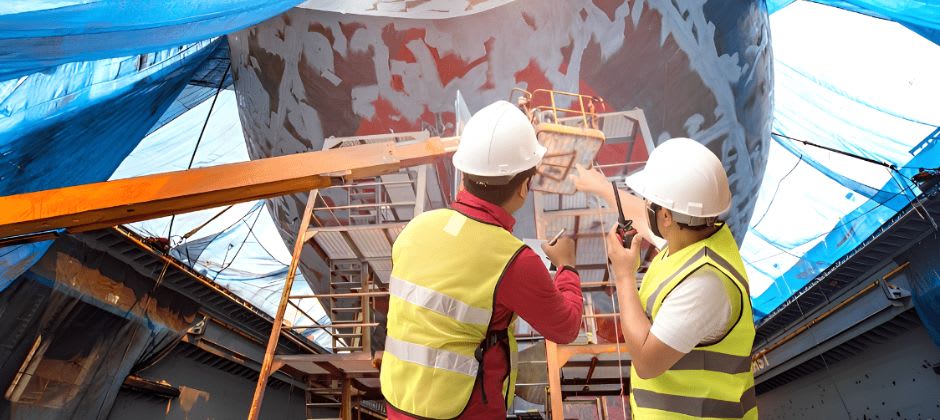Course description

Oil and Gas Marine Terminals Safety training course designed to cater to personnel transporting oil and gas cargoes by sea, including those working on tankers and in shore-based terminals. This meticulously structured course is intended to provide a comprehensive understanding of the hazards and associated risks inherent to the handling, exploration, exploitation, and transportation of oil and gas products onshore and sea.
Our program is tailored to meet the specific needs of maritime, shipping, and oil & gas professionals, ensuring a rigorous and in-depth exploration of the subject matter. This course will give participants valuable insights, knowledge, and skills to enhance safety and efficiency in their respective roles.
Join us on this educational journey as we delve into the complexities of oil and gas cargo transportation. Enrol today and equip yourself with the expertise to excel in this critical industry sector.
Upcoming start dates
Outcome / Qualification etc.
Delegates enrolling in the Oil and Gas Marine Terminals Safety training course will be able to:
- Identify the critical aspects of operations of oil & gas marine terminals
- Follow the updated international regulations & requirements dealing with such hazardous cargoes
- Carry out the planning of storage & transfer systems for different petrol products
- Understand the procedure of interaction with oil tankers and gas carriers
- Manage and organise the emergency response plans in case of oil spill
- Apply updated methods of risk assessment in marine terminal operation
Organisational Impact
By registering for the Oil and Gas Marine Terminals Safety course, the organisation will observe the following:
- Improved Operational Integrity for cargo handling
- Improved Operational Performance for terminal operators
- Improved Equipment-safe usage for pumping & piping arrangements
- Better Safety Records, in general
- Enhanced safety management in Terminals.
Training Course Content
HAZARDS ASSOCIATED WITH LIQUID AND GASEOUS CARGOES
- Flammability and explosion
- The Fire Triangle
- Flammable Ranges
- Limits of flammability in reduced Oxygen atmospheres
- Flash Point
- Effect of Cargo Contamination on Flashpoint
TOXICITY & EXPOSURE
- Forms of exposure
- Toxicity
- Sources of exposure
- Routes of Entry
- Effects of Substances Hazardous to Health
- Results of entry
- Describing Toxicity
- Specific Toxins
- Toxic Constituents of Inert Gas
- First Aid in Chemical Emergencies
- Action Plan for First Aid Treatment
- Casualty Management
SOURCES OF IGNITION
- Hazards Associated with Current Electricity
- Fixed and Portable Equipment
- Hazards associated with Static Electricity
- Charge generation
- Charge accumulation
- Electrostatic hazards during tank washing
- Ship Shore Bonding
- Synthetic clothing
- Transmitting Aerials
- Hand tools
- Pyrophoric Iron Sulphide
- Smoking
- Hot Work
- Control of Hot Work
- Approval for Hot Work
HAZARD CONTROL – TANKER DESIGN FOR SAFETY
- Designation of flammable hazardous areas
- Accommodation features
- The Citadel system
- Electrical protection in hazardous zones
- Maintaining safe tank atmospheres
- Inert Gas Systems
- Sources of Inert Gas
- Constituents of Flue Gas Inert Gas
- Flue Gas Uptake Valves
- Scrubber Tower
- Blowers (Fans)
- Maintaining safe tank atmospheres
HAZARD CONTROL – OPERATIONAL HAZARD MANAGEMENT
- Hazard and Risk Control
- Selection of control measures
- Safety equipment and protection of personnel
- Personal Protective Equipment (PPE)
- The role of PPE (Personal Protective Equipment)
- Portable Gas Detectors and Oxygen Analyzers
- Hydrocarbon Gas Detectors.
- Testing for poisons and other specialised substances
- Oxygen detection
- The hazards of enclosed spaces
- Hazards associated with Hydrocarbons
- Hazards associated with chemicals
- Other risks associated with confined spaces
- Testing atmospheres of enclosed spaces
- Long term sampling
- Breathing Apparatus, Respiratory Aids and Escape Sets
- Self-Contained Breathing Apparatus
- Air Line Breathing Apparatus
- Cartridge or Canister Face Masks
- Hose Mask (Fresh Air Breathing Apparatus)
- Maintenance of Respiratory Protection Equipment
POLLUTION PREVENTION
- Effects of marine pollution
- Natural dispersion of marine pollutants
- Preventing Marine Pollution
- The load on top principle (LOT)
- MARPOL
- MARPOL Special Areas
- Design features to avoid oil pollution
- Dedicated Clean Ballast Tanks (DCBT)
- Crude Oil Washing (COW)
- Slop Tanks
- Oil Content Monitors
- The Oil Record Book
- International Oil Pollution Prevention Certificate (IOPPC)
- Dealing with Pollution Emergencies
Request info
London Maritime Academy
London Maritime Academy provides a wide range of maritime training courses tailored to the global industry. Located in London and known for international standards, we offer diverse Classroom and Online courses taught by highly experienced experts in the maritime sector....

